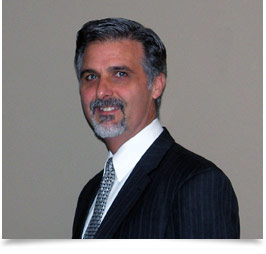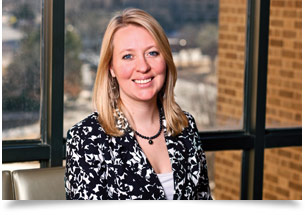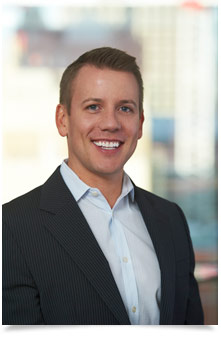Alumni Advantage Newsletter

Are you interested in receiving the 'Unfair Advantage' newsletter? If so, please click below to subscribe.
SubscribeJune 2013 Articles:
- Post Degree-Plan Blues
- My Advice
- From Part-Time to Primetime: 10 Tips to Elevate from Intern to Entry-Level
Unfair Advantage is a newsletter written by members of the National Professional Advisory Board of the College of Media & Communication and our friends. We'll give you insider advice, insight and inspiration so that, when you enter the real world, you are ready to rock it.
Post Degree-Plan Blues
By Mark deTranaltes

Mark deTranaltes
I recently spoke to my friend, Jennifer Y., she is trying to find her first job out
there in the big bad world. She is a better than average student, friendly, articulate,
focused. She has common sense, can write a complete sentence, is willing to start
at the bottom, and has the drive to succeed. And yet, she is frozen in her tracks
with anxiety about getting her first job.
Jen isn't sure what she wants to do. She is completing her degree in Communications,
but should she work for an agency?, look for an in-house shop?, explore sales? Should
she look at PR positions? Or just advertising and marketing? Trying to decide on the
direction AFTER she has gotten her degree seems to be more difficult than deciding
on her major four years earlier. After some pointed questions, and quick gut check
from Jen, I learned that she wants to work at an agency, but right now she just wants
a job in her field and she feels less than sincere about the interview process. I
told her, the first job doesn't need to be perfect, and that job interviewing is like
visiting different circles of friends.
Have you ever, in the course of single day, run into, or spoke with an old high school
friend, a current running buddy and finally a classmate. If so, you know the difference
in the three levels of conversation. When you are with an old friend you can share
stories, use vocabulary that only the two of you might know the significance of, and
be generally goofy if that is who you were when you first met, regardless of your
calm cool collective self now.
When you see your current friend, you might use different vocabulary, reference different
stories and you might even be a little more mature, being that your relationship is
based on the person you are now. Finally when you speak with a classmate, you might
be a little more formal, speak only about the one class you have in common, and in
all likelihood be more protective and reserved.
None of these conversations was more or less sincere than the other. Yet all three
were different. This is the same honest approach to interviewing. Of course there
will be positions that you feel more strongly about. And then there are the positions
you are less thrilled about, but maybe, once you get in the door, you can turn it
into a better job, or find a way to get to that next level. There is nothing wrong
with differentiating between the available positions, but you should not be less honest,
or feel you are not being sincere in your enthusiasm for the position. Believe me,
when you get that first job, you will have sincere joy, regardless of where it is.
The important part of the job search to stay focused on is activity. Create a list
of potential employers and always be adding to that list. Network with friends, and
friends of friends. If an employer isn't hiring, ask for 10 minutes to discuss the
market. Don't leave without another name/company you can call on. Do your homework,
never have a cold call, always warm it up through research. If you were set-up on
a blind date would you just show up or get on Facebook and check them out? Well get
on the company's web site and go to the About Us and the News/Press Release section.
Learn their history, their officers and what projects they are working on. (If you
are lucky you will be working on them too.)
Remember, don't be shy about exploring a wide variety of jobs, and stay active. It
will happen.
Mark deTranaltes is a 1987 alumnus of Texas Tech University with a Bachelor's degree in Advertising. Mr. deTranaltes spent the first twenty years of his career working for two international advertising agencies first at Omnicom's Bernard Hodes Group and then managing WPP's J. Walter Thompson's Houston office of JWT Inside. In 2008 deTranaltes made the jump from the Agency to the Client side of the business working for Staples in their corporate branding division. Most recently Mark took his years of marketing and management experience to the non-profit world of development, in his new role as Vice-President for Advancement as St. Thomas High School. He was recognized as an Outstanding Alumnus from the College of Media & Communication in 2007.
topMy Advice
By Rebecca Ortiz, Ph.D.

Rebecca Ortiz
Whether you are entering the workforce, looking for an internship, or considering graduate school, the piece of advice I can give is to reach out to others who have come before you. Almost every great job or life opportunity I have been blessed to receive came as the result of going out of my way to interact with people in that field. If someone is doing the job of your dreams, reach out to them. Ask them to coffee or lunch. Listen to their story. They have probably been where you were and can provide you with useful information. The worst thing they can do is say no, and the best thing could be a path to your dream career. Do not be afraid to ask for help and advice. Not everyone is going to be open to helping you, but you will be surprised at how many are willing. Then one day when you are successful, you will have someone contact you for advice, and you will know exactly how to respond.
Rebecca R. Ortiz serves as assistant professor of advertising in the College of Media and Communication. Her research is focused in the areas of
health communication, social marketing, and entertainment media effects.
Ortiz has managed and consulted on a number of health communication campaigns and
projects for such organizations as Syracuse University, the North Carolina Division
of Public Health, and the National Campaign to Prevent Teen and Unplanned Pregnancy.
Health topics included HPV vaccination, H1N1 vaccination, teen pregnancy prevention
and youth suicide prevention.
Her professional background is in advertising, marketing and journalism, having worked
for a community newspaper, a large advertising agency and a midsize direct marketing
firm. She received her Ph.D. in mass communication and a certificate in interdisciplinary
health communication from the School of Journalism and Mass Communication at the University
of North Carolina at Chapel Hill. She completed her master's in media studies from
Syracuse University and a bachelor's in business advertising at Virginia Commonwealth
University.
From Part-Time to Primetime: 10 Tips to Elevate from Intern to Entry-Level
By Tim Loecker, Senior Vice President, Weber Shandwick

Tim Loecker
Hopefully by now, all COMC students understand the critical importance of having an
internship to compete in today's marketplace.
From my early internships in Lubbock and Dallas to my current position with global
public relations and marketing agency Weber Shandwick, I've had many opportunities to see first-hand what makes good interns great and
sets them apart for that first full-time position. Many companies, including ours,
typically hire entry-level positions only following a rigorous and competitive internship.
These internships enable both the company and individual to go for a “talent test
drive.”
So what makes the new generation of storytellers sing? I surveyed junior and seasoned
colleagues, intern coordinators and friends from a diverse cross section of the industry.
Together with my own observations and learnings, I compiled a top-10 list of recurring
themes that help new college graduates stand out from the class:
- Critical Thinking and Resourcefulness – Don't just “Google it.” Exhaust every avenue and get creative to find answers to questions. Try to find out the “why” in addition to the “what” when taking on projects. Try to understand what's the overall strategy or macro-level view of the assignment to better understand and deliver a stronger work product. Be a self-starter, including teaching yourself key terms and acronyms, which shortens your learning curve and helps you become a strong contributor more quickly.
- Attention to Detail – The devil is in the details. Make sure your work is free from factual, grammatical or other errors and delivered on time. Produce client-ready work that doesn't need another round of reviews and edits. And details don't pertain just to your work product but also to your appearance – adhere conservatively to dress codes and maintain a polished look at all times. As they say, dress for the job you want, not the job you have.
- Time Management Skills – No more cramming for finals. The business world is too demanding to procrastinate until the eleventh hour. You often have to collect information from many people and complete work consisting of many steps along the way of a larger project. Don't wait until the last minute and create a crisis for someone else. Learn from your managers, colleagues and others how to put the most efficient process in place that works for your style and your team's needs. The earlier you can figure out how to manage your time appropriately, the more successful you will be.
- Proactivity – Be a mind-reader. Manage up to your manager, clients and others to anticipate what other project needs may be next. Don't be afraid to make recommendations without being asked, volunteering your ideas and your time whenever possible.
- Leadership – Lead by example. Whether leading a small project or helping manage a group initiative with fellow interns, demonstrate the leadership skills you honed throughout college. Make sure you and others are accountable, deadlines are met, problems addressed and solutions provided – all with an eye toward the highest ethical standards.
- Creativity – Climb out of the box. Actually, it's best if you're wholly unfamiliar with the concept of boxes. Set yourself apart with insightful and unignorable creativity. Consider how you can leverage each relevant communications platform in new and different ways.
- Engaging – Learn the rules of engagement. Connect with team members on a personal level. This will begin to develop your own network of influencers, contacts and mentors. Have a voice and an opinion. Make sure people see your unique personality and what parts of the business or projects interest you most. This often can lead more quickly to greater responsibility. Leverage the deep knowledge your colleagues have. Consider how you can learn from them and what resources can help you expand your skill sets. And always ask for feedback – the good, the bad and the ugly. That's how we all continue to learn and improve.
- Dedication – 9 to 5? Hardly. In today's 24/7 world, dedication and responsiveness is more important than ever. The upside: today's office environments are more flexible than ever, too. But from time to time, you should be willing to come in early, stay late, and volunteer weekend time to get the job done. This showcases a spirit of teamwork and strong work ethic.
- Adaptability – Be a chameleon. The communications industry continues to change quickly. Our talents also need to change and evolve to stay competitive. Have a great attitude and keep learning. You may learn from other experts in your office, professional development workshops, online training or just by staying current reading industry and client-related news.
- Attitude – Show ‘em some love. Make sure your team knows you've chosen this career path because you really enjoy the work and see a long-term future in this business. Express genuine interest in all aspects of the business. There always will be more interesting projects than others, but each one should be viewed as an opportunity to learn. Demonstrating a great attitude and putting solid effort into everything you do ultimately will translate into working on more of the projects you like. Show you are inherently interested in driving results for your team and ensuring successful completion of every project.
Tim Loecker is a senior vice president in the Dallas office of global communications firm Weber Shandwick, named “Global Agency of the Year” by The Holmes Report in 2012, PR News' 2012 “Digital PR Firm of the Year,” and “Agency Of The Decade” by Advertising Age in 2011. For the past 13 years, he has created and executed strategic communications programs for organizations ranging from Fortune 500 corporations to start-up enterprises across a diverse cross section of industries. His work has earned many industry awards from PRWeek, PRSA, IPRA, Bulldog Reporter and SABRE, among others. Tim is a member of the Texas Tech University College of Media and Communication's National Advisory Board and can be reached at tloecker@webershandwick.com or on Twitter @timloecker.
topArchive
College of Media & Communication
-
Address
Texas Tech University, Box 43082, Lubbock, TX 79409 -
Phone
806.742.6500
